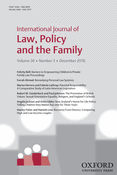-
Views
-
Cite
Cite
Robert M. Vanderbeck, Paul Johnson, The Promotion of British Values: Sexual Orientation Equality, Religion, and England’s Schools, International Journal of Law, Policy and the Family, Volume 30, Issue 3, December 2016, Pages 292–321, https://doi.org/10.1093/lawfam/ebw012
Close - Share Icon Share
Abstract
Schools in England have recently become subject to new requirements regarding the active promotion of ‘fundamental British values’. This concept has controversially been defined to encompass sexual orientation equality. In this article, we argue that the inclusion of sexual orientation equality within the scope of British values has given new impetus to debates about the appropriate balance between children’s rights, the right of parents to provide religious direction to children, the prerogatives of faith schools, and the state’s legitimate interest in protecting sexual minorities. We trace the evolution of the current legal and policy framework related to British values, including its alignment to the Prevent counter-extremism strategy, and then draw on recent Ofsted reports to critically examine claims that the new requirements undermine the ability of faith schools to teach about sexuality from the perspective of a particular religious ethos. Using the example of the Marriage (Same Sex Couples) Act 2013, we also highlight ambiguities that exist in relation to the British values requirements as applied to faith schools. We conclude that current controversies over British values and schooling show important continuities with debates from the Section 28 era (1988–2003), during which local authorities were prohibited from intentionally promoting homosexuality. Specifically, a key source of contestation remains the still indeterminate border between the promotion of a particular sexual orientation and the promotion of tolerance for individuals and groups. Overall, the article contributes to a broader understanding of the ways in which schools in diverse international contexts have become involved in the governance of sexual and religious difference.




